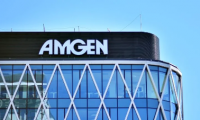-
Blackstone Unveils Immunology Startup With $300M and a Phase 2-Ready Drug From Merck
- Source: drugdu
- 78
- May 17, 2024
-
Companies prepare for ADC trial readouts at ASCO 2024
- Source: drugdu
- 114
- May 17, 2024
-
New Synthetic Biomarker Technology Differentiates Between Prior Zika and Dengue Infections
- Source: drugdu
- 92
- May 16, 2024
-
Hengrui Pharmaceuticals Innovative Drug SHR-2173 Injection for IgA Nephropathy Indication Approved for Clinical Use
- Source: drugdu
- 75
- May 16, 2024
-
BIO-THERA BAT1308 (PD-1) in combination with BAT8006 (ADC- FRα) approved for clinical trials in advanced solid tumors
- Source: drugdu
- 132
- May 14, 2024
-
TOFIDENCE™ (tocilizumab-bavi) tocilizumab biosimilar launched for sale in the U.S.
- Source: drugdu
- 72
- May 9, 2024
-
Amgen reports a 22% increase in Q1 2024 net revenues
- Source: drugdu
- 115
- May 6, 2024
-
Amgen Puts Its Weight Behind Obesity Drug With Potential Edge Over Lilly, Novo Nordisk Meds
- Source: drugdu
- 113
- May 6, 2024
-
BigHat Biosciences partners with Janssen Biotech
- Source: drugdu
- 108
- May 5, 2024
your submission has already been received.
OK
Subscribe
Please enter a valid Email address!
Submit
The most relevant industry news & insight will be sent to you every two weeks.













